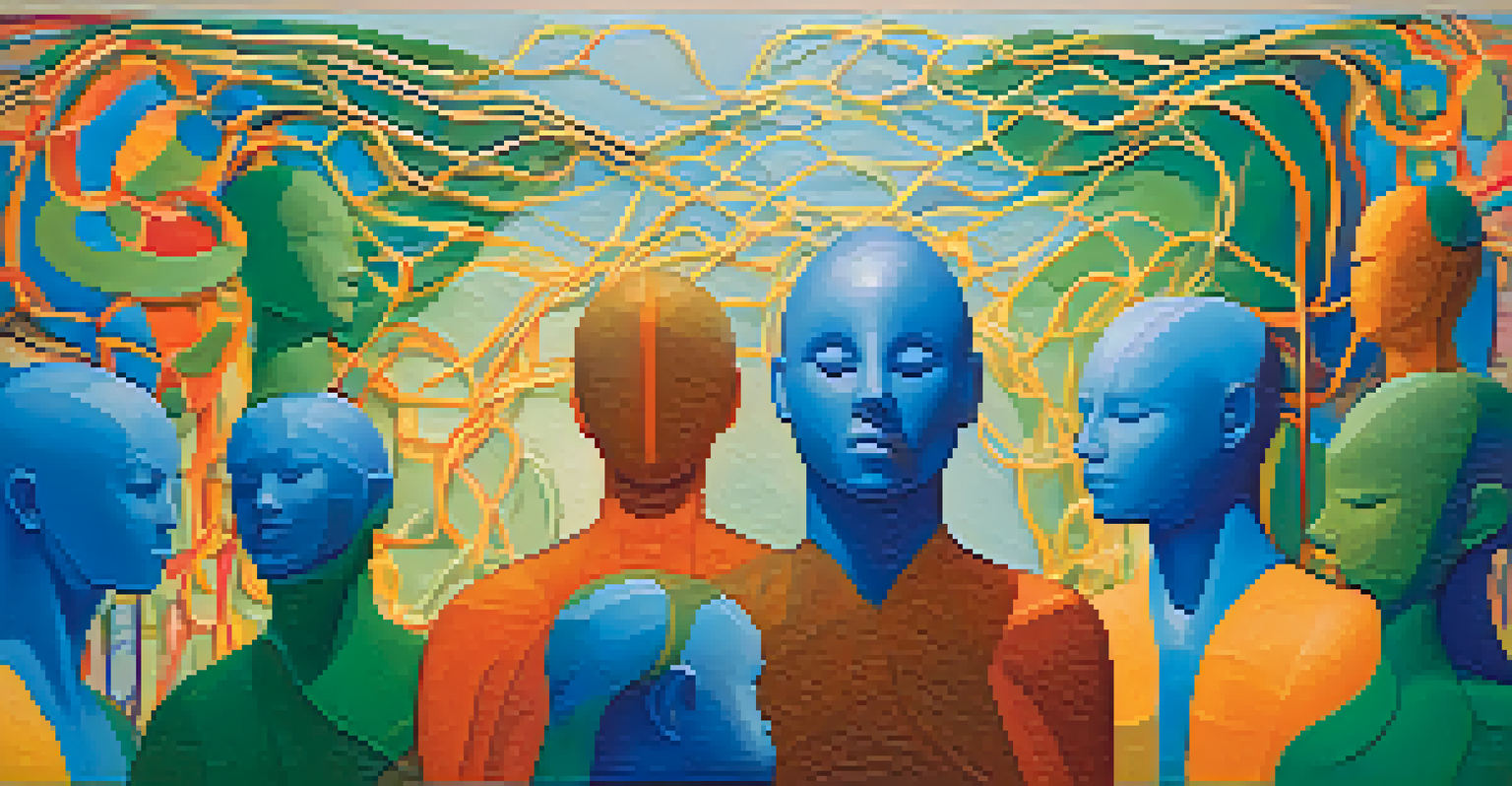Exploring the Therapeutic Benefits of Hallucinogens in Groups

Understanding Hallucinogens and Their Uses in Therapy
Hallucinogens, such as psilocybin and LSD, have been studied for their potential in therapeutic settings. These substances can alter perception, mood, and cognitive processes, opening the door to new perspectives on mental health. By creating profound experiences, they can help individuals confront deep-seated emotions and traumas. In recent years, there's been a resurgence of interest in their therapeutic applications, particularly in group settings.
The mind is everything. What you think you become.
The therapeutic use of hallucinogens often aims to treat conditions like PTSD, anxiety, and depression. When used in a controlled environment, these substances can facilitate emotional breakthroughs that might not occur in traditional therapy. This is partly because the altered state of consciousness can lead to a sense of unity and interconnectedness among participants, fostering a supportive atmosphere for healing. Group therapy combined with hallucinogens takes advantage of the power of shared experiences.
Researchers have found that group dynamics can enhance the effectiveness of hallucinogens in therapy. Participants often feel more comfortable sharing their experiences when they are part of a group, leading to deeper connections and insights. This communal aspect not only helps individuals process their experiences but also cultivates a sense of belonging and support that is essential for mental health recovery.
The Role of Group Dynamics in Healing
Group dynamics play a crucial role in the therapeutic process, especially when incorporating hallucinogens. The sense of safety and shared vulnerability allows individuals to explore their inner worlds more freely. In a supportive group, participants can witness each other's journeys, which can validate their own experiences and encourage openness. This collective exploration creates a rich tapestry of insights that can enhance personal growth.

Moreover, groups can foster empathy and understanding among participants. As individuals share their stories and struggles, others in the group can resonate with similar experiences, promoting a sense of solidarity. This shared emotional landscape can be incredibly powerful, as it reminds participants that they are not alone in their challenges. The empathy cultivated in these sessions can lead to lasting bonds that extend beyond the therapeutic experience.
Therapeutic Potential of Hallucinogens
Hallucinogens like psilocybin and LSD are being explored for their ability to facilitate emotional breakthroughs in mental health therapy.
Additionally, the presence of a trained facilitator can guide the group through the experience, ensuring a safe and structured environment. Facilitators help navigate the emotional highs and lows that can arise during sessions, offering support and grounding when needed. Their role is vital in maintaining a positive atmosphere that encourages exploration and healing, making group sessions more effective than individual experiences.
Enhancing Introspection Through Shared Experiences
One of the most significant benefits of group therapy with hallucinogens is the enhancement of introspection. Participants often report that witnessing others' journeys helps them gain insights into their own lives. This reflective process can lead to deeper understanding and realizations that might not surface in solitary sessions. The shared space allows for a rich exchange of ideas and emotions, facilitating a profound journey of self-discovery.
We are not human beings having a spiritual experience; we are spiritual beings having a human experience.
When individuals see their experiences mirrored in others, it can spark new perspectives and insights. This phenomenon, often referred to as 'collective consciousness,' underscores the interconnectedness of human experiences. Participants may find solace in knowing that their feelings and struggles resonate with others, which can be incredibly empowering. The shared nature of the experience can help individuals feel more grounded and connected to their own journey.
Furthermore, the conversations that follow these experiences can be just as therapeutic as the sessions themselves. After a session, participants often engage in discussions that help them process their emotions and insights. These conversations can solidify the lessons learned during the hallucinogenic experience, making it easier to integrate those lessons into daily life. The dialogue creates a communal space for healing, where insights can flourish.
Building Trust and Connection in Group Settings
Building trust within a group is essential for the success of therapeutic hallucinogen sessions. Trust allows participants to feel safe enough to share their vulnerabilities and engage deeply with their emotions. As individuals open up about their experiences, the bonds formed during these sessions can lead to a stronger support network. This connection is vital for sustaining the healing process beyond the group setting.
Trust is often cultivated through pre-session discussions that establish group norms and expectations. Facilitators play a key role in guiding these conversations, ensuring that everyone feels heard and respected. By creating an atmosphere of acceptance and understanding, participants are more likely to engage fully with the experience. This foundation of trust fosters a sense of community that can enhance the therapeutic effects of hallucinogens.
Group Dynamics Enhance Healing
The supportive atmosphere of group therapy can foster empathy and deeper connections, enhancing the therapeutic effects of hallucinogens.
Additionally, the shared experience of exploring altered states of consciousness can deepen connections among participants. When individuals navigate the highs and lows together, they create memories and insights that can solidify their relationships. These connections can provide ongoing support and encouragement, which are crucial as participants continue their healing journeys.
Addressing Challenges and Ethical Considerations
While the therapeutic benefits of hallucinogens in group settings are promising, it's essential to address the challenges and ethical considerations involved. Not everyone may be suited for group experiences, and individual readiness should always be assessed. Factors such as mental health history, personal comfort levels, and the potential for adverse reactions must be carefully considered. A thorough screening process is vital to ensure that all participants can engage safely and constructively.
Moreover, facilitators must navigate the complexities of group dynamics, ensuring that no one feels overshadowed or marginalized during sessions. It's crucial to create a balanced environment where everyone's voice is valued. Ethical considerations also extend to informed consent, as participants must fully understand what they are entering into before beginning their journey. Transparency about the risks and benefits is essential for fostering an ethical therapeutic setting.
Lastly, as research into the therapeutic use of hallucinogens continues to evolve, so too must the guidelines governing their use. Ongoing education and training for facilitators are necessary to keep up with best practices. Establishing ethical frameworks will help ensure that these powerful substances are used responsibly and effectively in group therapy settings, maximizing their potential benefits.
The Future of Hallucinogens in Group Therapy
The future of hallucinogens in group therapy appears bright, with growing interest and research supporting their therapeutic potential. As more studies emerge, the medical community is beginning to recognize the value of these substances in treating mental health disorders. This shift in perspective could pave the way for more widespread acceptance and integration of hallucinogens into therapeutic practices. The dialogue surrounding these substances is evolving, with an emphasis on responsible use and informed consent.
Additionally, as public perception shifts, more individuals may feel comfortable exploring hallucinogens as a therapeutic option. This could lead to an increase in group therapy sessions that incorporate these substances, allowing for broader access to their benefits. The potential for hallucinogens to enhance personal growth and healing in a group context is becoming more evident, encouraging further exploration and innovation in therapeutic settings.
Ethical Considerations in Therapy
It's crucial to address individual readiness and ethical guidelines to ensure safe and constructive group experiences with hallucinogens.
Moreover, advancements in research methodology and understanding of hallucinogens will likely lead to refined approaches in group therapy. This may include tailored programs that consider individual differences while maximizing the benefits of shared experiences. As we continue to explore the therapeutic landscape, the integration of hallucinogens in group settings could revolutionize the way we approach mental health treatment.
Conclusion: Embracing the Power of Shared Healing
In conclusion, exploring the therapeutic benefits of hallucinogens in group settings offers a promising avenue for mental health treatment. The combination of shared experiences, trust, and empathy can create a powerful healing environment. Participants can gain unique insights and emotional breakthroughs that are often magnified in a supportive group context. As research continues to unfold, the potential of these substances to transform lives becomes increasingly apparent.
The communal aspect of group therapy not only fosters individual healing but also builds lasting connections among participants. By embracing the power of shared healing, we can create spaces where vulnerability is celebrated and growth is nurtured. As we move forward, it's crucial to approach this work ethically and responsibly, ensuring that everyone involved is supported and informed.

Ultimately, the journey into the therapeutic use of hallucinogens in groups is just beginning. The insights gained from these experiences may hold the key to unlocking new paths toward mental wellness. As we continue to explore and understand the potential of these substances, we open ourselves to a future where healing can be both personal and communal.